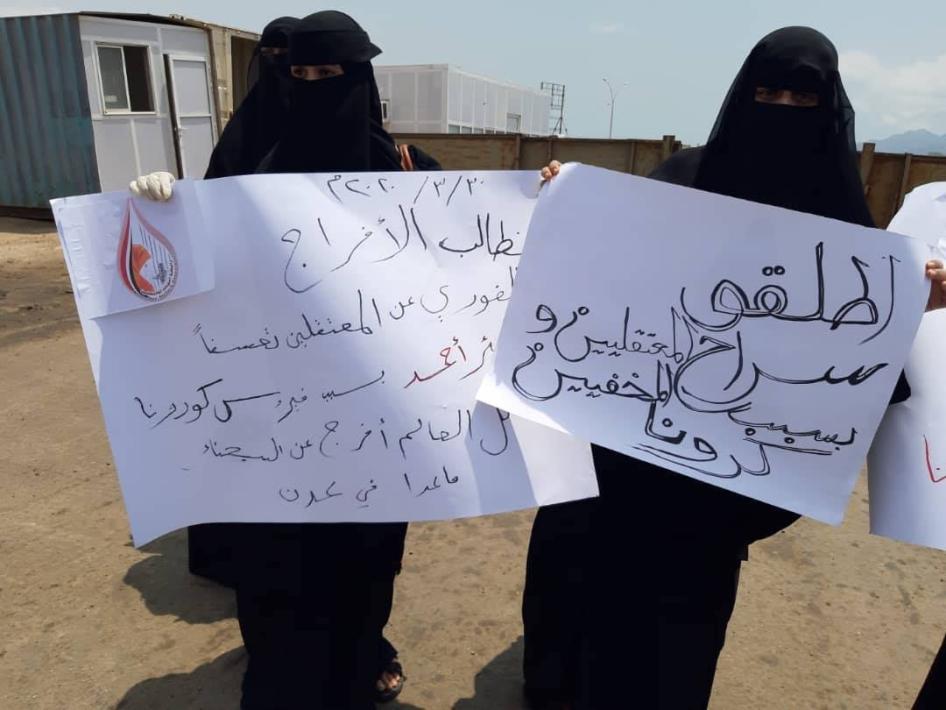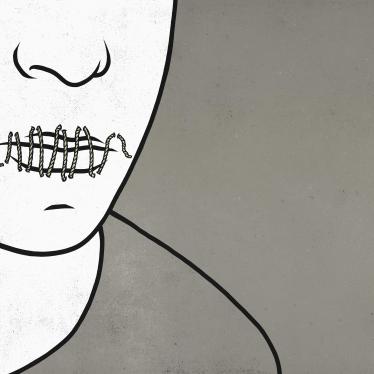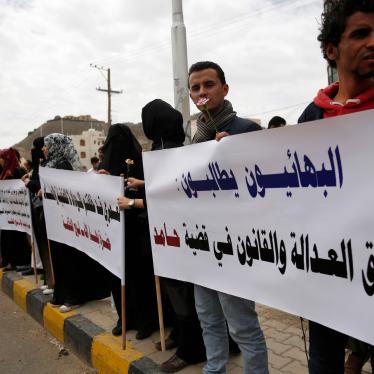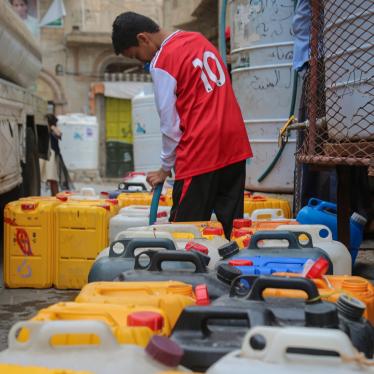(Beirut) – Detainees at a detention facility in Yemen’s southern Aden governorate face serious health risks from the rapidly spreading Covid-19 pandemic, Human Rights Watch said today. Bir Ahmed is an overcrowded, informal detention facility in a military camp controlled by Yemeni authorities affiliated with the United Arab Emirates (UAE)-backed Southern Transitional Council.
Relatives of 5 detainees told Human Rights Watch that the detention facility authorities in early April 2020 transferred 44 detainees into a room of only about 10 square meters that had previously held 4 people. The detainees lack masks, gloves, and hygiene products to protect themselves from Covid-19, and basic healthcare services. The authorities should take immediate steps to ease the extreme overcrowding and reduce the risk from the virus, starting by releasing those held without charge or for exercising their basic rights.
“The grossly overcrowded conditions and absence of health care at Aden’s Bir Ahmed facility threatens the lives of detainees and facility staff as Covid-19 spreads in Yemen,” said Michael Page, deputy Middle East director at Human Rights Watch. “The Southern Transitional Council authorities should urgently address the inhumane detention conditions and release those detained arbitrarily.”
The Mothers of Abductees Association (MAA), a group started in 2017 by Yemeni women whose relatives had been arrested and often forcibly disappeared, said that detainees have been held at Bir Ahmed without charge or trial for up to two years. The group said that detainee accounts indicated that one guard died from Covid-19-like symptoms in May and another became severely ill with Covid-19 symptoms. Relatives and MAA members expressed particular concern for the health of detainees because detention facility authorities have refused to allow visits since May 1 and have provided no information about their loved ones’ health.
The women said that during weekly communications in April, the men complained that detention facility authorities had denied detainees protective equipment such as masks, hand sanitizer, and soap to clean their rooms, as well as adequate food. The authorities also deprived detainees of medicine for chronic health conditions, such as asthma and kidney disease.
The wife of a 37-year-old man arbitrarily detained at Bir Ahmed since January 2018 said that armed men in uniforms of the Emirati-backed Security Belt forces had arrested her husband at their home without giving any reason. She said that during her last visit to the detention facility in April 2020, “he looked pale, with a serious skin disorder in many parts of his body and he had pain in his kidney, and he wasn’t receiving any medical care.”
The detainees’ relatives said that the authorities have denied their family members air conditioning or fans during the summer, when temperatures regularly reach up to 38 or 40 degrees Celsius (101 degrees Fahrenheit).
“I don’t know how my son could survive in that overcrowded room, in unbearable heat and potentially contracting Covid-19 and yet not being offered medical care,” said the mother of a 22-year-old man detained at Bir Ahmed since mid-2019. She said that Security Belt forces were holding her son to force his cousin, who is wanted by Security Belt forces, to turn himself in. She said that her son was forcibly disappeared from January through June 2019 before he appeared at Bir Ahmed. Her son did not know where he was held during those first six months, she said.
MAA said that “some Bir Ahmed detainees had told family members that they felt stuffed into an oven because of the extreme heat and humidity.” The wife of a 44-year-old detainee held without charge since early 2018 said, “During my last call with him in late April, he told me that he was in pain all over his body with some skin disease that we could not name because he wasn’t checked by a doctor. He started crying while telling me about the pain in his sensitive areas.”
As Yemen’s healthcare system has by all accounts collapsed during the armed conflict, Covid-19 has spread across much of the country and proven to be extremely deadly. Mark Lowcock, the United Nations under-secretary-general for humanitarian affairs, told the UN Security Council on June 24 that Covid-19 was spreading rapidly across Yemen and that 25 percent of the confirmed cases had been fatal, about “five times the global average.”
The detainees’ relatives said that they have been staging small demonstrations most weekends since detention facility authorities began denying visits and calls, demanding visits and information about the well-being of their loved ones. “I make sure to go to the demonstrations even though I have cancer and I feel sick, hoping the authorities will allow us a visit, which might be the last time I get to see my son,” said a woman whose 26-year-old son has been detained since early 2019. He had been forcibly disappeared for 11 months before he appeared at Bir Ahmed, she said.
In 2017, Human Rights Watch documented abuses in Bir Ahmed when detainees went on hunger strike to protest inhumane detention conditions. In 2019, Human Rights Watch documented abuses implicating the Southern Transitional Council and the Security Belt.
The Yemeni human rights group Mwatana released a report on June 30, 2020 documenting arbitrary detention, enforced disappearances, and torture in informal detention centers. The report concluded that the Houthis were responsible in more than half of the cases, and that UAE-backed armed groups were responsible for hundreds of cases in areas under their control, including Aden.
In March, the UN Group of Eminent International and Regional Experts on Yemen reported on the appalling detention conditions in Yemen and urged all parties to the conflict to:
immediately release all detainees and political prisoners being held in political, security and military detention facilities, official and secret alike, in order to prevent and mitigate the risks of COVID-19 contagion in the whole of Yemen, in line with their obligations under International Law.
The experts also reported on poor conditions at another detention facility known as Bir Ahmed II, including “arbitrary detention, enforced disappearance, torture and ill-treatment of detainees involving the United Arab Emirates and the affiliated forces.”
“Aden authorities should end the multiple rights violations inherent in cramming detainees in a horrifically confined space during the Covid-19 pandemic and release those never charged or posing no risk,” Page said.









